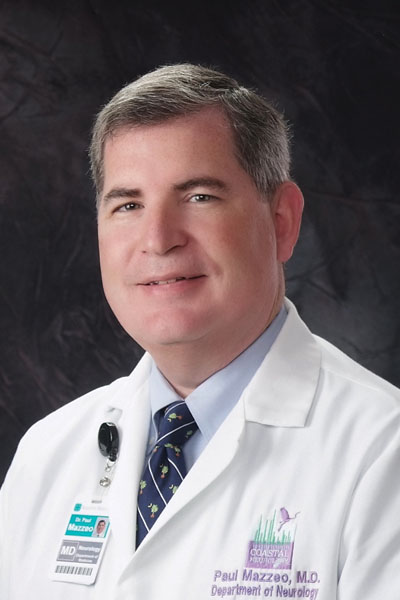
We can prevent so many health conditions with screenings, lifestyle changes and medication. But we still don’t fully understand all the causes of dementia.
“There are different types of dementia, all of which affect the brain in unique ways,” says Dr. Paul Mazzeo, a board-certified neurologist and the medical director of the Beaufort Memorial Memory Center. “We are still learning the causes of these brain changes and if there are ways to prevent them.”
Types of Dementia
Dementia is an umbrella term for conditions that cause memory loss, lead to declines in cognitive skills, and trigger personality, behavioral and emotional changes. Some common forms of dementia include:
- Alzheimer’s disease. Approximately 60%-80% of people with dementia have this condition. Amyloid plaques and tau tangles are the hallmarks of this disease. Researchers believe these plaques and tangles may damage and destroy nerve cells.
- Vascular dementia. This form of dementia is caused by strokes or injuries to blood vessels in the brain from stroke risk factors such as high blood pressure, diabetes and high cholesterol.
- Lewy body dementia (LBD). The third-most common form of dementia, LBD occurs when harmful protein deposits called Lewy bodies build up in the brain. People with LBD may have tremors and other symptoms associated with Parkinson’s disease. LBD proteins are associated with another form of dementia, known as Parkinson’s disease dementia, which can develop in those with Parkinson’s disease.
- Frontotemporal dementia. This condition leads to the gradual loss of nerve cells in and eventual shrinkage of the areas of the brain behind the forehead (frontal lobes) and ears (temporal lobes).
- Mixed dementia. This refers to having more than one form of dementia.
Read More: Alzheimer’s vs. Normal Aging – How to Tell the Difference
Who Develops Dementia?
Although there is no single cause of dementia-related brain changes, research suggests there are certain factors associated with an increased risk. Those include:
- Age
- Ethnicity — Latinos and African Americans appear to be at higher risk
- Family history
- Sex — women appear to be at higher risk
- History of heart-related conditions, such as diabetes, heart disease, high blood pressure, high cholesterol and stroke
There is also some evidence to suggest that hearing loss and a history of repeated moderate or severe traumatic brain injuries could increase the risk of certain forms of dementia, although more research is needed to confirm these links.
Preventing Dementia
“It can be hard to accept the unknowns about dementia,” Dr. Mazzeo says. “However, there is evidence that certain lifestyle changes may reduce the risk.”
A good first step is to protect your heart. Heart conditions, such as high blood pressure and heart disease, can damage the blood vessels that supply your brain with oxygen. Managing high blood pressure, cholesterol and blood sugar along with regular exercise will protect your heart and your head.
Next, eat a healthy diet. Filling your plate with fruits, vegetables, whole grains and lean sources of protein keeps your heart healthy and, according to a study in the journal Neurology, helps reduce inflammation, which may contribute to dementia.
“There’s no one food that fights dementia or improves memory,” Dr. Mazzeo says. “Yet there’s encouraging evidence that the MIND diet, a combination of the Mediterranean diet and the Dietary Approaches to Stop Hypertension, or DASH, diet to lower high blood pressure, reduces dementia risk.”
Incorporating MIND foods into your diet several days a week helps improve overall health. In the order of importance, recommended foods include:
- Vegetables, especially leafy greens
- Berries
- Whole grains
- Fish
- Poultry
- Beans
- Nuts
- Healthy oils, such as olive oil
Finally, limit processed foods, sugar, full-fat dairy products and red meat. These foods may increase inflammation and heart disease risk.
“Lifestyle changes that encourage healthy aging can help you physically and mentally,” Dr. Mazzeo says. “Stay social, get enough sleep, address depression and other mental health issues, and avoid tobacco and alcohol. Your overall health will benefit.”
The Beaufort Memorial Memory Center can help you or a loved one manage a dementia diagnosis. Call 843-522-5674 to schedule an appointment.

